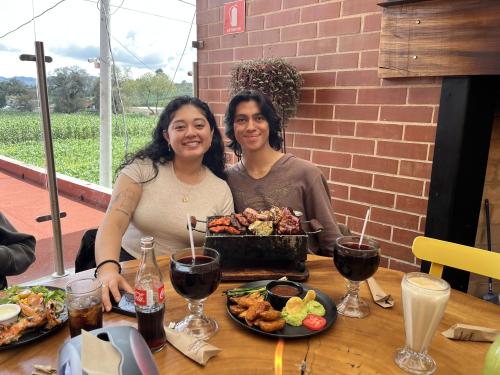Mayan Language Institute: Nathan Maldonado Student Profile
Interview by Sydney Humphrey
Nathan Maldonado is a junior at Duke University, triple majoring in computer science, linguistics, and psychology. Although he now calls Durham, North Carolina, home, Nathan grew up in Los Angeles. Nathan initially developed an interest in the K’iche’ language as a means to connect with his family’s history and his Indigenous heritage. Since arriving at Duke, his unique combination of talents, interests, and life experiences has inspired him to explore language preservation technology and support corpora expansion for low-resource languages such as K’iche’ and other indigenous languages. Making the most of his undergraduate years, Nathan has already begun investigating artificial intelligence bias in large language models specific to fleeting and endangered languages as a Huang Research Fellow at Duke, and he just completed a summer of K’iche’ study through the Mayan Language Institute in Guatemala. Although furthering his study of K’iche’ with the Mayan Language Institute will support his research as he continues his journey in academia, Nathan explained that the primary motivator for his participation in the program was the opportunity to connect with his own Indigenous culture and gain further insight into his family's history. Beyond his studies, Nathan also enjoys knitting, blogging, and photography—all skills which he put to good use this summer in Guatemala!

Why did you decide to participate in the Mayan Language Institute?
Following the Indigenous genocide, or la violencia, my family's migration story began alongside one and a half million other Guatemalans who fled their homes. My father reached Los Angeles and hesitated to teach me K'iche', fearing our family would be targeted. While storytelling exists as a pillar of Indigenous histories and culture, my father still bites his tongue when asked about his time in Guatemala or childhood. This struggle to speak with my father in his mother tongue has fueled my passion for further language exploration. To honor my blood, I have chosen to participate in the Mayan Language Institute and continue our indigenous story.
What have you learned from this experience that was unexpected?
At the end of each meal, "Buen provecho" would echo throughout the house, a melody sung by my host family and classmates with no counterpart in English. Translation is never one-to-one, and the ability to employ multiple languages to convey certain ideas enriches the linguistic landscape of Guatemala.
An unexpected challenge for me coming into the program has been translating ideas from Spanish or English into K'iche' when certain words or phrases do not exist. However, conversing with my classmates and professors has meant shifting this mindset from translating my thoughts to, instead, thinking in K'iche', for it holds as many ideas incapable of being described in other languages.
Do you think the Mayan Language Institute will have an impact on your future? How?
The Mayan Language Institute and the opportunity to study computer science and linguistics will connect me to the Mayan culture I have lost. These fields act as vehicles for rectifying my heritage and reconnecting me to those with a stake in preserving our Mayan history. As a computational linguist, I hope to pursue further investigations into computer science at the intersection of information and social implications.
Nevertheless, my interest is not simply in developing novel technologies but in reinforcing the preservation of vulnerable languages and cultures. Thus, my experience through the Mayan Language Institute will serve my understanding of broader indigenous narratives relevant to Guatemala and Central America.
Share with us an anecdote from these past weeks/days. It can be something that condensed the learning experience, or a memorable experience you had with your peers, professors or the community.
After dinner with one of the host families, their eldest son revealed to me and another Guatemalan classmate that our 'ways of being' were uniquely Maya. He persisted that our Indigenous story continues in our faces, our perspectives, and our language. Upon telling him about my father's own migration story to Los Angeles from Totonicapan, he shared his sentiments: "Tu familia no lloraron lágrimas de agua, lloraban sangre" (Your family did not cry tears of water; they were crying blood).
Later, while trekking home, we passed a mural of American-owned bulldozers pillaging Guatemalan farmland. For context, the word K'iche' translates literally to "many trees" or "forest." This provocative illustration, which still paints itself in my mind a thousand times over, inserts the image of forest slashings and abuse of not just the homeland of indigenous Guatemalans but of the K'iche' people themself. I left dinner and arrived home with the understanding that my responsibility was to now keep our Indigenous stories. Yet, our history is something I can never hold.
